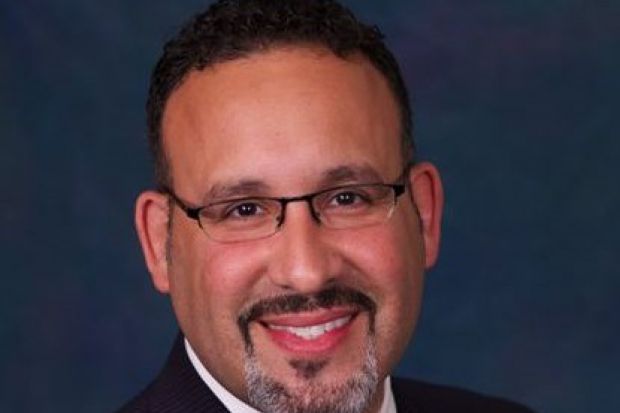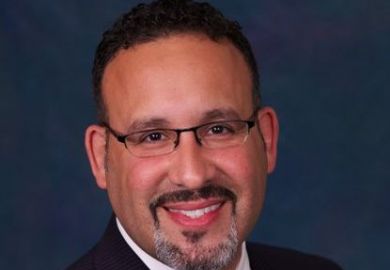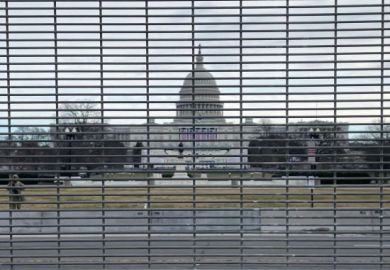US president Joe Biden’s nominee for education secretary, Miguel Cardona, used his confirmation hearing before the US Senate to signal his plans to pursue deeper integration between schools and universities.
Dr Cardona, raised by Spanish-speaking Latino parents in low-income housing, told the Senate’s education committee that he hoped the strategy would give disadvantaged students more job-oriented pathways to post-secondary education, with greater mixes of technical training and traditional academics.
A native of Connecticut, where he spent the past year as state education commissioner, Dr Cardona said his own son already was taking college courses as part of his junior year in high school.
“That shouldn’t be the exception,” he told a three-hour hearing that emphasised the Biden administration’s overall emphasis on pursuing societal equity, and ended with the panel’s top Republican backing his nomination.
The largely drama-free display offered a stark contrast to the contentious scene four years earlier. The nominee then, Betsy DeVos, a billionaire with no background in education, struggled through several sharp exchanges while displaying little familiarity with some key issues she was facing.
The closest Dr Cardona came to any sparring involved several Republican senators who took turns expressing their displeasure with US Supreme Court rulings upholding the rights of transgender students. Dr Cardona made clear his support for the court’s position and agreed to work with Republicans on finding common ground on details of implementation.
“We have to make sure that we’re honouring our students,” Dr Cardona told one of the committee members, Roger Marshall, a Republican of Kansas. “I recognise this is not easy, and I respect the perspectives of people who feel differently,” Dr Cardona said.
Shortly after the hearing, the Biden administration announced its choice of Michelle Asha Cooper, the head of a non-profit group that works to help low-income and disadvantaged students with college, to one of the department’s top positions for higher education policy.
Dr Cooper, after spending the past decade as president of the Institute for Higher Education Policy (IHEP), was selected to serve as an assistant secretary for post-secondary education. The president of the American Council on Education, Ted Mitchell, called her a “fabulous choice”, saying her work put IHEP “at the forefront of policy work aimed at eliminating racial disparities in educational outcomes”.
Dr Cardona’s emphasis on job-related training reflects a key priority among many Republicans and Democrats, and a source of concern among some in academia who fear a loss of emphasis on liberal arts and the lifelong and community-wide benefits of higher education.
While Republicans are eager to meet the needs of companies, Dr Cardona said he hopes to find that greater balance of educational missions to better meet the needs of disadvantaged students. He noted that the Pell grant – the main federal grant award for low-income college students – now covers only about a quarter of student expenses in state colleges, down from about three-quarters in 1975.
“It’s much more difficult to access higher ed now,” he said. Educational systems across all levels can help, said Dr Cardona, by offering students clearer pathways starting at young ages.
Mr Biden won the presidential election promising to find a way to make college free for low-income students. Yet that question was barely raised during the hearing. Instead, senators of both parties put emphasis on helping former students struggling under an estimated $1.5 trillion (£1.1 trillion) in education-related loan debt.
Among his first acts in office, Mr Biden extended for another eight months a Covid-driven moratorium established in the Trump administration that spares borrowers from making payments or accumulating interest on federal student loan debts.
North Carolina senator Richard Burr, the top-ranking Republican on the committee assessing Dr Cardona’s nomination, urged him against accepting the suggestion by some Democrats that Mr Biden use his power of debt postponement to grant broad permanent forgiveness of such debts.
Instead, Mr Burr said, he welcomed a bipartisan measure that would greatly simplify repayment options, allowing borrowers to “pay whatever they can reasonably afford”, capped at 10 per cent of their discretionary income, and granting full forgiveness after 20 years.
Register to continue
Why register?
- Registration is free and only takes a moment
- Once registered, you can read 3 articles a month
- Sign up for our newsletter
Subscribe
Or subscribe for unlimited access to:
- Unlimited access to news, views, insights & reviews
- Digital editions
- Digital access to THE’s university and college rankings analysis
Already registered or a current subscriber?







